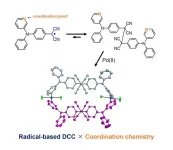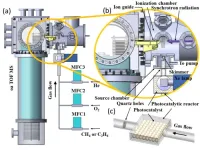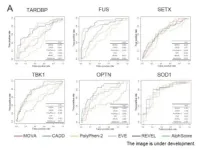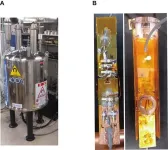(Press-News.org)
People who adhere to global Cancer Prevention Recommendations are putting themselves at lower risk of developing the disease, new research confirms.
Experts at Newcastle University have reviewed evidence of following the 2018 World Cancer Research Fund (WCRF) and American Institute for Cancer Research (AICR) lifestyle-based recommendations.
The findings, published today in Cancer, revealed that adhering to a healthier lifestyle, including maintaining a healthy body weight and eating little red meat and processed meats such as bacon, helps to stave off several forms of the disease.
Further evidence
Approximately 40% of all cancers are linked with modifiable lifestyle factors - such as physical inactivity, tobacco use, living with obesity, a poor diet, and alcohol intake, suggesting many cases are preventable.
Scientists found that each 1-point increment in a score used to assess adherence to these Cancer Prevention Recommendations resulted in a 12% lower risk of bowel cancer, 11% reduction in risk of breast cancer, and 8% lower chance of lung cancer.
Dr Fiona Malcomson, Lecturer in Human Nutrition at Newcastle University’s Human Nutrition and Exercise Research Centre, is a co-author of the study.
She said: “This is the first study to review the evidence to date on the impact of following the latest version of the World Cancer Research Fund and American Institute for Cancer Research Cancer Prevention Recommendations and the risk of developing cancer.
“Our findings are exciting as they provide further evidence of some of the best ways to reduce the risk of cancer, in particular breast, bowel, and lung cancers.
“By following these recommendations, people may reduce their risk of certain cancers, and we would recommend that people adhere to them as closely as possible.
“The evidence for the effects of lifestyle factors is stronger for certain cancers. For example, eating a lot of red and processed meat increases the risk of bowel cancer, and drinking alcohol can raise your risk of cancers such as breast, bowel, and oesophageal.”
However, there are other non-modifiable factors, such as a family history of cancer, and environmental exposures that can also affect people’s risk of developing the disease.
Scientists carried out a systematic review and meta-analysis of 18 published studies which investigated associations between adhering to the 2018 recommendations and the incidence of different cancers.
The WCRF/AICR Cancer Prevention Recommendations are the conclusions of an independent panel of experts – they represent a package of healthy lifestyle choices which, together, can impact on people’s likelihood of developing cancer.
The recommendations are:
be a healthy weight
be physically active
eat a diet rich in wholegrains, vegetables, fruits, and beans
limit “fast foods” and other processed foods high in fat, starches, or sugars
limit consumption of red meat and processed meat
limit consumption of sugary sweetened drinks
limit alcohol consumption
do not use supplements for cancer prevention
for mothers, breastfeed your baby, if you can
after a cancer diagnosis: follow the WCRF/AICR Recommendations, if you can
‘Deepens understanding’
Dr Panagiota Mitrou, Director of Research, Policy and Innovation at World Cancer Research Fund, said: “This study deepens our understanding of the impact our Recommendations have on reducing cancer risk.
“The more evidence we have demonstrating how following our Recommendations as a pattern of behaviours can reduce cancer risk, such as having a healthy diet, keeping active and maintaining a healthy weight, the more we can support positive change.”
This research was carried out as part of the Cancer Lifestyle Prevention Recommendations (CALIPER) UK Study, a £280,000 study involving Newcastle University’s Professors John Mathers and Linda Sharp, and Dr Fiona Malcomson, funded by the Wereld Kanker Onderzoek Fonds (WKOF).
Further research is needed to confirm these findings in relation to additional cancer sites. The CALIPER UK Study, a collaboration between Newcastle University and Glasgow University, is using data from the UK Biobank to investigate whether greater adherence to the Recommendations changes the risk of developing cancer at 14 sites in a UK population.
Reference: Adherence to the 2018 World Cancer Research Fund (WCRF)/ American Institute for Cancer Research (AICR) Cancer Prevention Recommendations and cancer risk: a systematic review and meta-analysis. F.C. Malcomson et al. Cancer. DOI: 10.1002/cncr.34842
Ends
Notes to Editors:
The World Cancer Research Fund cancer statistics are based on combined data from England, Scotland, Wales, and Northern Ireland, 2019/2020.
It is estimated that around 40% of cancers are associated with modifiable risk factors. Approximately half of this percentage is caused by smoking; other factors include overweight and obesity, diet, nutrition, drinking alcohol, and physical activity.
About World Cancer Research Fund
World Cancer Research Fund examines how diet, nutrition, body weight and physical activity affect your risk of developing and surviving cancer. As part of an international network of charities, it has been funding life-saving research, influencing global public health policy, and educating the public since 1982.
While society continues searching for a cure, WCRF’s prevention and survival work is helping people live longer, happier, healthier lives – free from the devastating effects of cancer. www.wcrf-uk.org and Twitter, Facebook, Instagram and Linkedin.
Preventing Cancer. Saving Lives.
END
A research group led by Professor Hideki Fujiwara and Associate Professor Daisuke Sakamaki from the Graduate School of Science at Osaka Metropolitan University succeeded, for the first time, in synthesizing a new molecule using a novel combination of dynamic covalent chemistry, in which organic radicals couple and dissociate reversibly, and coordination chemistry, which binds radicals to metal ligands. The study shows that the two types of reactions work without inhibiting each other.
“This research was based on a very simple idea of combining two types of reactions,” stated Professor Sakamaki. “However, it was not clear ...
Increased levels of Lipoprotein(a), a variant of ‘bad cholesterol’, in the bloodstream are a risk factor for recurrent coronary heart disease (CHD) in people aged 60 or over, according to the results of a new study which tracked the issue over the course of 16 years.
The results, published today in Current Medical Research & Opinion, suggest that current cholesterol-lowering medications may not be effective at reducing the risk of recurrent CHD – such as a heart attack – due to elevated Lp(a).
“This finding adds to growing evidence of a relationship between increased Lp(a) and the risk of recurrent CHD,” says lead author Associate Professor ...
Prof. PAN Yang and Associate Researcher LIU Chengyuan, researchers from the University of Science and Technology of China (USTC) of the Chinese Academy of Sciences (CAS), have achieved significant progress in detecting intermediates in methane photocatalytic reactions. Their technique, Synchronous Radiation Photoionization Mass Spectrometry (SR-PIMS), allows for in-situ detection of active intermediates. The findings were published in the prestigious chemistry journal Angewandte Chemie International ...
A team led by Academician Prof. GUO Guangcan from the Chinese Academy of Sciences (CAS) provides a comprehensive overview of the progress achieved in the field of quantum teleportation. The team, which includes Prof. HU Xiaomin, Prof. GUO Yu, Prof. LIU Biheng, and Prof. LI Chuanfeng from the University of Science and Technology of China (USTC),CAS, was invited to publish a review paper on quantum teleportation in Nature Review Physics. The paper was officially released online on May 24.
As one of the most important protocols in the field ...
A point-to-point long-distance quantum key distribution (QKD) over a distance of 1,002 km has been achieved by scientists from the University of Science and Technology of China (USTC) of the Chinese Academy of Sciences (CAS), and their collaborators from Tsinghua University, Jinan Institute of Quantum Technology, and Shanghai Institute of Microsystem and Information Technology (SIMIT), CAS. This milestone not only sets a new world record for non-relay QKD but also provides a solution for high-speed intercity quantum communication. The ...
Posters
All poster presentations will take place on Monday, June 12, 2023, from 12:15 to 1:30 p.m. EDT, or Tuesday, June 13, 2023, from 12:15 to 1:30 p.m. EDT at the Baltimore Convention Center, Exhibit Hall E, Level 100.
Abstract 4-M (Monday)
Avoiding Clinical Inertia: Comparing Time to Intensification of Glucagon-like
peptide-1 (GLP-1) Receptor Agonists in Patients with Type 2 Diabetes Mellitus Among Clinical Pharmacists versus Providers
Clinical pharmacists have a significant impact on medication optimization and reduction ...
Niigata, Japan - The Department of Neurology at Niigata University has developed a new in silico method for evaluating the pathogenicity of missense variants using AlphaFold2 (MOVA). Rare variants in the causative gene of ALS are present in 10-30% of sporadic ALS cases, which highlights the need for accurate and efficient pathogenicity prediction methods. To predict the pathogenicity of the variants, in silico analysis methods are commonly used. In some ALS causal genes, the mutations are concentrated in specific regions, and the accuracy of pathogenicity prediction can be improved by considering the positional information of the variants. ...
Niigata, Japan - The gold standard test for predicting the onset of diabetic kidney disease is albuminuria. However, detecting albuminuria alone has limited sensitivity and specificity in end-stage renal failure with a decreased estimated glomerular filtration rate. This is supported by several reports, which state that about half of the type 2 diabetes patients who developed kidney dysfunction showed no preceding albuminuria.
In this study, the authors propose the possibility of diagnosing tubular abnormalities in diabetic kidney disease at an early stage and connecting them to treatment by combining the evaluation of sodium concentration using 23Na MRI ...
Older female mice had more immune cells entering areas of the body where they shouldn’t according to a new study, demonstrating that sex differences contribute to age-related inflammation that needs to be considered in future research.
In a paper published in Journal of Leukocyte Biology today (Tuesday 13 June), at team of researchers led by Dr Myriam Chimen from the University of Birmingham have found that age significantly increases the number of immune cells entering the sack that holds major organs (peritoneal cavity) in female mice, when compared to young mice or older male mice.
The findings support previous studies that suggest ...
Peer-reviewed / Randomised Controlled Trial / People
Study of healthy US adults found that a single dose of the VLA1553 vaccine candidate was generally safe, well tolerated and provokes an immune response.
After a single vaccination, the vaccine produced neutralizing antibody levels which are thought to protect against chikungunya disease in 99% (263/266) of participants.
Antibody levels declined 28 days after vaccination, but seroprotection persisted in more than 96% (233/242) participants after six months.
Most adverse events were moderate or mild and the authors say its safety profile is similar to other licensed vaccines
The VLA1553 vaccine candidate ...





